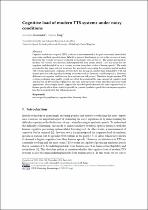JavaScript is disabled for your browser. Some features of this site may not work without it.
- ResearchSpace
- →
- Research Publications/Outputs
- →
- Conference Publications
- →
- View Item
| dc.contributor.author |
Govender, Avashna

|
|
| dc.contributor.author |
King, S

|
|
| dc.date.accessioned | 2024-01-11T13:03:27Z | |
| dc.date.available | 2024-01-11T13:03:27Z | |
| dc.date.issued | 2023-11 | |
| dc.identifier.citation | Govender, A. & King, S. 2023. Cognitive load of modern TTS systems under noisy conditions. http://hdl.handle.net/10204/13517 . | en_ZA |
| dc.identifier.uri | http://hdl.handle.net/10204/13517 | |
| dc.description.abstract | Cognitive load of text-to-speech (TTS) synthesis systems measured in the past consistently showed that processing synthetic speech is more difficult to process than human speech in the presence of noise. However, the systems previously evaluated are no longer state-of-the-art. The quality produced by modern TTS systems are considered indistinguishable from human speech. Does this mean that the cognitive load demanded by such systems are now equivalent to that of human speech? The work presented in this paper, sets out to answer this question by measuring the cognitive load of modern TTS systems under noisy conditions. Results show that the gap of cognitive load demanded by TTS and human speech is reducing when listening to systems such as Tacotron 2 and Fastspeech 2. However, differences in cognitive load between these systems are still present. Therefore, despite modern TTS systems producing high quality speech, not all of them demand the same amount of cognitive load and thus not all TTS systems will provide the same user experience when embedded into real-world applications. Interestingly, results suggest that vocoded speech demands the same cognitive load as human speech which shows that it is possible to generate synthetic speech that can impose cognitive load that is equivalent to that of human speech. | en_US |
| dc.format | Fulltext | en_US |
| dc.language.iso | en | en_US |
| dc.relation.uri | https://cognitive-ai.netlify.app/ | en_US |
| dc.relation.uri | https://cognitive-ai.netlify.app/program/ | en_US |
| dc.source | Cognitive AI 2023, Bari, Italy, 13-15 November 2023 | en_US |
| dc.subject | Text-to-speech | en_US |
| dc.subject | Pupillometry | en_US |
| dc.subject | Cognitive load | en_US |
| dc.subject | Listening effort | en_US |
| dc.title | Cognitive load of modern TTS systems under noisy conditions | en_US |
| dc.type | Conference Presentation | en_US |
| dc.description.pages | 6 | en_US |
| dc.description.note | 2023 Copyright for this paper by its authors. Use permitted under Creative Commons License Attribution 4.0 International (CC BY 4.0). | en_US |
| dc.description.cluster | Next Generation Enterprises & Institutions | en_US |
| dc.description.impactarea | Voice Computing | en_US |
| dc.identifier.apacitation | Govender, A., & King, S. (2023). Cognitive load of modern TTS systems under noisy conditions. http://hdl.handle.net/10204/13517 | en_ZA |
| dc.identifier.chicagocitation | Govender, Avashna, and S King. "Cognitive load of modern TTS systems under noisy conditions." <i>Cognitive AI 2023, Bari, Italy, 13-15 November 2023</i> (2023): http://hdl.handle.net/10204/13517 | en_ZA |
| dc.identifier.vancouvercitation | Govender A, King S, Cognitive load of modern TTS systems under noisy conditions; 2023. http://hdl.handle.net/10204/13517 . | en_ZA |
| dc.identifier.ris | TY - Conference Presentation AU - Govender, Avashna AU - King, S AB - Cognitive load of text-to-speech (TTS) synthesis systems measured in the past consistently showed that processing synthetic speech is more difficult to process than human speech in the presence of noise. However, the systems previously evaluated are no longer state-of-the-art. The quality produced by modern TTS systems are considered indistinguishable from human speech. Does this mean that the cognitive load demanded by such systems are now equivalent to that of human speech? The work presented in this paper, sets out to answer this question by measuring the cognitive load of modern TTS systems under noisy conditions. Results show that the gap of cognitive load demanded by TTS and human speech is reducing when listening to systems such as Tacotron 2 and Fastspeech 2. However, differences in cognitive load between these systems are still present. Therefore, despite modern TTS systems producing high quality speech, not all of them demand the same amount of cognitive load and thus not all TTS systems will provide the same user experience when embedded into real-world applications. Interestingly, results suggest that vocoded speech demands the same cognitive load as human speech which shows that it is possible to generate synthetic speech that can impose cognitive load that is equivalent to that of human speech. DA - 2023-11 DB - ResearchSpace DP - CSIR J1 - Cognitive AI 2023, Bari, Italy, 13-15 November 2023 KW - Text-to-speech KW - Pupillometry KW - Cognitive load KW - Listening effort LK - https://researchspace.csir.co.za PY - 2023 T1 - Cognitive load of modern TTS systems under noisy conditions TI - Cognitive load of modern TTS systems under noisy conditions UR - http://hdl.handle.net/10204/13517 ER - | en_ZA |
| dc.identifier.worklist | 27459 | en_US |






